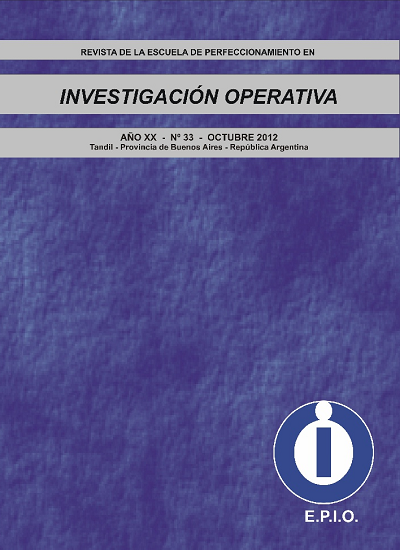Control of the economic adaptation in electrical energy distribution systems by means of a dynamic optimization model. Part I: preference models under uncertainties and optimization possibilities
Keywords:
economic adaptation, risk analysis, multicriteria optimization, electric distribution systemsAbstract
The concept of Economically Adapted Distribution System, is based on the Neo-Classic Economics Paradigm. It is related only to the productive efficiency, which implies the expansion and operation of system with a minimum cost. It ignores the uncertainties, or it renders them a stochastic nature, which they do not necessarily show to have. In this work, a model to evaluate the Deadaptation System degree, in the regulatory control periods, is presented.
The model, based in Multicriteria Optimization and non stochastic incertainties, suggest a change of paradigm from the approach of Incertainty and Risk proposed by Pos-Keynesianism. A strong difference between Static Optimization respect to Non Stochastic Dynamic, proposed in the Posibilistic Model, and a complete and new theoretical development, for application in a real Case of Study, are presented as important results and conclusions of this work. In this First part of work, the development of Preferences Model under uncertainties and Dynamic Possibilistic Optimization Model, are presented.
Downloads
References
SCHWEICKARDT G. (2007): “SISTEMAS DE DISTRIBUCIÓN DE ENERGÍA ELÉCTRICA ECONÓMICAMENTE ADAPTADOS. DISCUSIÓN Y PROPUESTAS METODOLÓGICAS”. Editorial Fundación Bariloche.
SCHWEICKARDT G., MIRANDA V. (2007): “UN MODELO DE PLANIFICACIÓN Y CONTROL ORIENTADO A LA ADAPTACIÓN ECONÓMICA DE SISTEMAS DE DISTRIBUCIÓN DE ENERGÍA ELÉCTRICA”. Revista de la Escuela de Perfeccionamiento en Investigación Operativa - Nro. 28 – pgs. 30, 49.
GARCÍA E., SCHWEICKARDT G., ANDREONI A. (2008): “A NEW MODEL TO EVALUATE THE DYNAMIC ADAPTATION OF AN ELECTRIC DISTRIBUTION SYSTEM”. Energy Economics, ELSEVIER - Vol. 30, issue 4 - pgs. 1648,1658.
SCHWEICKARDT G., MIRANDA V. (2009): “A TWO-STAGE PLANNING AND CONTROL MODEL TOWARD ECONOMICALLY ADAPTED POWER
DISTRIBUTION SYSTEMS USING ANALYTICAL HIERARCHY PROCESSES AND FUZZY OPTIMIZATION”. International Journal of Electrical Power & Energy Systems, ELSEVIER - Vol. 31 - issue 6 – pgs. 277, 284.
DOUBOIS D., PRADE H. (1980): “FUZZY SETS AND SYSTEMS: THEORY AND APPLICATIONS”. New York, London, Toronto Press.
ZADEH L. (1970): “THE CONCEPT OF A LINGUISTIC VARIABLE AND ITS APPLICATION TO APROXIMATE REASONING”. Memorandum ERL- 411,
Berkeley.
LAVOIE M. (1992): “FOUNDATIONS OF POSTKEYNESIAN ECONOMIC ANALISYS”. Edward Elgar Publishing.
SCHWEICKARDT G., PISTONESI H. (2007): “DISCUSIÓN SOBRE EL CONCEPTO DE SISTEMA ECONÓMICAMENTE ADAPTADO APLICADO A LAS REDES DE DISTRIBUCIÓN ELÉCTRICA”. Revista Energética, Universidad Nacional de Colombia, Medellín- Nro. 37 - pgs 53, 65.
SAATY T. (1977): “A SCALING METHOD FOR PRIORITIES IN HIERARCHICAL STRUCTURES”. Journal of Mathematical Psycology. Vol. 15 – pgs. 234, 281.
P. LAX P. (1997): “LINEAR ALGEBRA”, Wiley Interscience: New York, 1997.
KAUFMANN A., GUPTA M. (1985): “INTRODUCTION TO FUZZY ARITHMETIC. THEORY AND APPLICATIONS”. Van Nostrand Reinhold Electrical/Computer Science and Engineering Series.
YAGER R. (1977): “MULTIPLE OBJECTIVE DECISION MAKING USING FUZZY SETS”. Intl. J. Man-Machine Studies. Vol. 9 – pgs. 53,64.
BELLMAN R., DREYFUS E. (1962): “APPLIED DYNAMIC PROGRAMMING”. Princeton University Press.
BELLMAN R., ZADEH L. (1970): “DECISION-MAKING IN A FUZZY ENVIRONMENT. MANAGEMENT SCIENCE”. Vol. 17 – pgs. 141,164.
Downloads
Published
Issue
Section
License
Atribución — Usted debe dar crédito de manera adecuada, brindar un enlace a la licencia, e indicar si se han realizado cambios. Puede hacerlo en cualquier forma razonable, pero no de forma tal que sugiera que usted o su uso tienen el apoyo de la licenciante.
NoComercial — Usted no puede hacer uso del material con propósitos comerciales.
CompartirIgual — Si remezcla, transforma o crea a partir del material, debe distribuir su contribución bajo la misma licencia del original.







